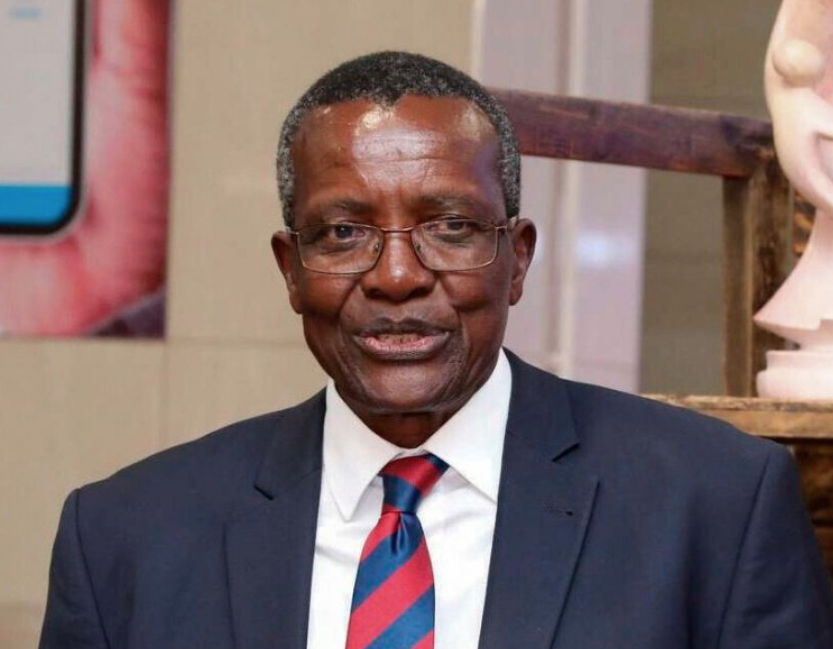

Former Chief Justice David Maraga has declared that his 2027 presidential bid will offer Kenyans clean, accountable and ethical leadership, positioning himself as a moral alternative to President William Ruto.
Maraga, who has thrown his hat into the ring, is casting his campaign as a break from politics traditionally driven by massive spending and tribal alliances.
In an exclusive interview with the Star, the former CJ outlined a grassroots-driven strategy anchored on value-based politics and institutional reform.
Dismissing claims that he is a “state project” fronted to undermine former Interior CS Fred Matiang’i, Maraga urged critics to judge him by his actions.
“I have refused to answer the question because no one would believe me even if I say I wasn’t. All I can say is: watch this space,” he said.
Maraga said his decision to run was motivated by what he described as a looming national crisis.
"It is the way things have been run in this country. If we all stay back and watch, we will find ourselves drowning in the Indian Ocean. Everyone will suffer. We should not let those in power mess the country when we are watching," he warned, lamenting a historic decline in governance standards.
He revealed that his campaign is taking shape through boardroom meetings with various stakeholder groups, complemented by grassroots engagements aimed at shaping a people-driven manifesto.
Unlike rivals banking on political alliances, Maraga said his approach is methodical and issue-based, deliberately focused on building a coalition of supporters before striking deals.
"Campaigns for this kind of position require friends and supporters backing your cause," he noted.
On coalitions, he stressed that partnerships were inevitable but would not be driven by convenience.
“Any partnership must align with my core vision of honest, transparent governance and strict adherence to the rule of law,” he said.
The former CJ also disclosed that his campaign will lean heavily on digital platforms for fundraising and direct engagement with Kenyans.
He envisions a government staffed by qualified professionals based on merit, regional balance and integrity.
Maraga took issue with previous administrations, including the current one, for ignoring key constitutional mandates.
"I want to run an honest government where corruption is not tolerated," he stated, directly contrasting his ethos with the current administration’s record.
The ex-CJ’s vision has been billed as resonating with a disillusioned electorate, particularly Gen Z protesters.
Some observers, however, hold that they are sceptical that his clean image could be co-opted by power brokers to split opposition votes.
When questioned about his candidacy’s viability against rivals, including former Deputy President Rigathi Gachagua, Matiang’i, Wiper leader Kalonzo Musyoka and Martha Karua, Maraga welcomed the competition as healthy for democracy.
He dismissed concerns about splitting the Kisii vote with Matiang’i, noting that the presidency requires national, not merely ethnic, appeal.
"Kisii and Nyamira are not the only ones who vote," he remarked, reiterating his ambition to transcend tribal politics.
However, analysts note that both face an uphill battle against entrenched ethnic voting patterns, with the Kisii community itself divided between the two.
His judicial legacy, particularly the nullification of the 2017 presidential election, remains a pillar of his campaign, symbolising courage and integrity for supporters.
Maraga sharply criticised Ruto’s style of leadership, citing the President’s anti-corruption efforts.
He dismissed the multi-agency team (MAT) led by the Office of the President as a "deception" and a "PR exercise".
For the ex-CJ, placing the team under presidential authority compromises independence, equating it to "the President investigating himself,". He called for empowering existing institutions like the EACC with adequate resources instead.
He pledged to combat "budgeted corruption" by enforcing rigorous scrutiny of departmental expenditures and ensuring accountability for audit irregularities, claiming they are currently ignored with impunity.
On judicial challenges in corruption cases, he defended courts, emphasising that collapses result from insufficient evidence or investigator connivance, not judicial failure, and vowed to hold investigative agencies accountable for lapses if he takes over the presidency.
Addressing the economy, Maraga linked taxation to service delivery, asserting that citizens deserve tangible returns for their contributions.
He promised to revive the economy by curbing wastage and ensuring public funds are directed towards tangible services like healthcare and infrastructure.
"Kenyans are tired of being taxed without seeing results," he observed, highlighting widespread frustration over graft and inefficiency.
Despite his principled stance, Maraga faces significant hurdles, including limited funding, political inexperience and a fragmented home base.
Moreover, his reliance on youth support may not suffice in a system where tribal allegiance often dictates voter behaviour.
Yet, for many Kenyans, his entry represents a beacon of hope - at least for his backers, and a chance to reset a system plagued by corruption and impunity.
INSTANT ANALYSIS
As the 2027 race intensifies, Maraga’s ability to convert moral authority into electoral success will depend on how he mobilises support on the ground. He could also champion the unity of opposition forces and prove that integrity can indeed triumph in the country’s murky political waters.















